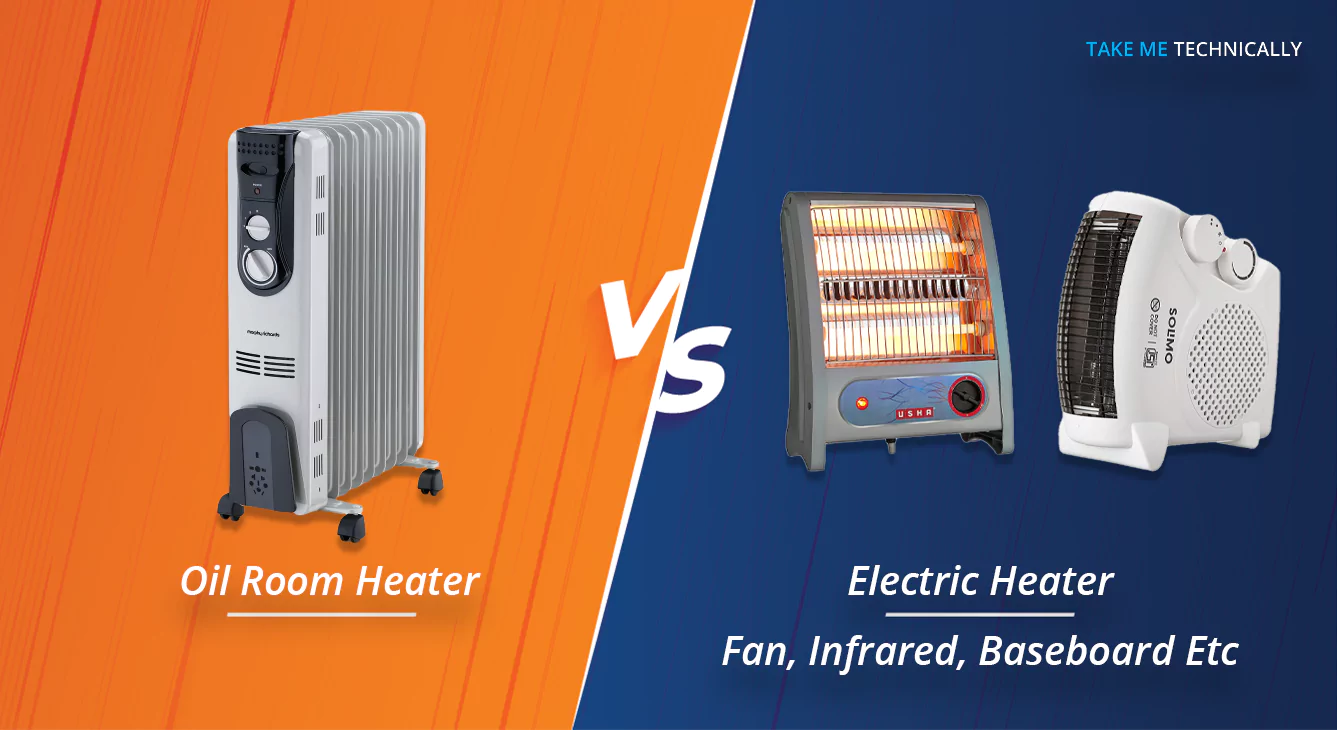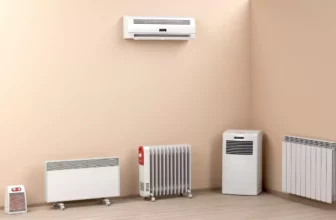
Are you in a dilemma about which room heater is most suitable for your needs? This article aims to guide you through the decision-making process, focusing on the ideal size and the better choice between an oil-filled heater and an electric heater. By the end, you’ll have a clear understanding of what’s right for you.
Selecting the perfect portable heater involves key considerations:
- Size of your room
- Area to be heated
- Level of versatility required
- Available storage space
Choosing a room heater in India can be challenging due to factors like room size and climate. This guide addresses these challenges to help you make an informed decision.
The article will delve into the differences between oil-filled heaters and electric room heaters. This comprehensive comparison will assist you in choosing the best small heater for various purposes:
- Surviving cold months
- Heating the bedroom
- Keeping the kids warm
- Warming a large room
By the end of the guide, you’ll be equipped with the knowledge to select the most suitable room heater based on your specific requirements.
Electric Heaters V/S Oil Heaters: Which One Is Better?
Electric heaters are compact and lightweight, making them ideal for smaller rooms. They offer rapid heating, which is why they are a popular choice for smaller spaces. On the other hand, oil-filled heaters excel in larger rooms and commercial-style offices. They use 99 percent of the electricity for heating and operate quietly, making them the perfect choice for such spaces.
Our experts have conducted thorough research and analysis to create this comprehensive guide, helping you determine which heater is best suited for your needs. For a complete understanding, dive into this comparison, where we outline the pros and cons and identify the specific scenarios in which each heater excels.
Must read, Advantages and Disadvantages of Oil-Filled Heaters
What Is an Oil-Filled Room Heater?
Oil-filled radiators are convection room heaters that utilize electrically heated oil as a heat reservoir. The heating unit, along with the fins or wings, generates convectional heat, ensuring a long-lasting and warm atmosphere. For more information, you can also explore ‘The Best Oil-Filled Heaters in India.’
Advantages of Oil-Filled Heaters
Here are some of the most significant benefits of having an oil-filled radiator (OFR) heater in your home, which you can consider the pros of oil-filled heaters. Let’s explore the major advantages of an oil-filled heater:
Energy Efficiency: While it consumes a similar amount of energy or sometimes even more compared to electric heaters, oil-filled radiators have lower power consumption. The oil inside the radiator is heated, which, in turn, warms the fins. Through radiation, these fins heat their surroundings. Once the desired temperature is reached, the heater automatically turns off, running for longer periods than electric heaters, making them more energy-efficient.
Long-Lasting Warmth: Oil-filled radiators retain heat exceptionally well, generating warmth for an extended period. Even after being turned off, an oil heater continues to emit heat for several hours, which is not only energy-efficient but also conducive to a comfortable night’s sleep.
Environmentally Friendly: Oil-filled room heaters use the oil as a medium to distribute heat efficiently rather than burning it as fuel. This makes them eco-friendly, as they have low energy consumption. The oil within the heater can last for many years without needing replacement, reducing the carbon footprint.
Quiet Operation: Oil-filled heaters operate silently as they utilize convection heating and do not rely on fans. They are much quieter than electric room heaters, providing both comfort and warmth without disruption.
Safety: Oil-filled heaters are often considered one of the safest heating options. They pose no fire risk, and there is minimal risk of clothing or curtains coming into contact with the heater and catching fire. As a result, they are an excellent choice for households with babies, children, and the elderly.
Portability: While heaters may need to be moved from room to room occasionally, oil-filled heaters are typically heavier than electric heaters. However, they are equipped with four wheels, making them more portable and easier to transport.
Low Maintenance: Before making a purchase, it’s essential to consider maintenance requirements. Electric heaters often require more maintenance, involving tasks such as changing tubes, halogen elements, fans, and thermostats. Oil-filled heaters, on the other hand, have lower maintenance needs.
Disadvantages of an Oil Heater
Slow Heat Production: It takes some time to heat the oil to the desired level. Unlike electric heaters that can instantly warm a room, oil heaters gradually emit heat. This is because heat from oil-filled radiators must traverse metal fins before reaching the air. Consequently, it may take up to 30 minutes for the room to warm up completely.
Heavier than Electric Heaters: Due to their more substantial construction, oil-filled heaters can weigh up to 20 kg. They are bulkier than electric room heaters but remain portable thanks to their built-in wheels.
Higher Cost: These heaters typically come at a higher price point compared to regular electric fan heaters. However, they often result in long-term cost savings for you.
What Is an Electric Room Heater?
An electric room heater is a device designed for spot heating in small to medium-sized spaces. Electric heaters, also known as blowers, fans, or convection heaters, generate heat using electricity. Each electric heater contains a heating element that operates based on the Joule heating principle, where electrical energy is transformed into heat energy as an electric current flows through a resistor.
Electric heaters excel at quickly heating small spaces. They typically feature a heating element made of metal or ceramic for rapid heating. These heaters are generally categorized into two groups: those without fans and those with fans.
Advantages and Disadvantages of Electric Heaters
Electric heaters offer several advantages, but they also come with some drawbacks. Let’s explore the pros and cons of electric heaters.
Advantages (Pros) of Electric Heaters
Low Purchase Cost: Electric heaters are generally more affordable than advanced heaters like oil-filled models. Prices typically range from 500 to 3000 rupees due to stiff competition among manufacturers.
Quick or Instant Heating: Electric heaters use exposed coils made of ceramic and metal to produce direct heat, resulting in instant and rapid room heating. Some models even feature fans to distribute heat more effectively. These qualities make electric heaters an excellent choice for quick and temporary heating, and some come with oscillation features to evenly spread warmth.
Portability: Electric heaters are significantly lighter than oil-filled heaters, making them easy to move from one location to another. If you need a heater that’s portable and versatile for different rooms, electric heaters are a suitable choice.
Oscillation: Many modern electric room heaters are equipped with oscillation systems, moving back and forth in a regular rhythm to evenly distribute heat throughout the space. They don’t produce direct heat but rather spread warmth effectively.
Disadvantages and Cons of Electric Heaters
Noisy Operation: Electric heaters with fans can be noisy due to the continuous operation of the fan. The persistent fan noise can be a downside for those who prefer quiet heating solutions.
Safety Concerns: Electric heaters have exposed electric coils and steel bodies, making them a fire hazard when placed near flammable materials. They also become quite hot to the touch, raising safety concerns, especially if near curtains or soft furnishings.
Maintenance Required: Electric heaters need regular maintenance because they rely on fans. Over time, heating coils can rust, and fans can accumulate dust. Regular maintenance, such as cleaning and replacing components, is necessary to ensure their longevity.
Lack of Heat Retention: While electric heaters heat up quickly, they also lose heat rapidly once turned off. This instantaneous heating and cooling can be a drawback, as the room cools down as fast as it heats up.
High Power Consumption: Electric heaters require continuous power for extended periods. The need for continuous electricity to maintain warmth can result in higher energy consumption and costs.
Health Concerns: Electric heaters are not recommended for prolonged, continuous use in enclosed spaces. Although they do not consume ambient oxygen, extended use may lead to discomfort or health concerns in closed spaces.
So, What Is the Best Heater for You?
We’ve provided you with ample information on oil-filled vs. electric heaters. However, determining which one is the best choice ultimately depends on your specific needs and the factors we’ve discussed. This guide is designed to help you narrow down your options and find the ideal heater for your home, workplace, or other requirements.
It’s important to remember that the “best” option varies based on your preferences and budget constraints.
Read also, Buying Guide for Room Heater
FAQ:
What Is the Best Heater for the Bedroom?
Do oil heaters burn a lot of electricity?
Are electric heaters more efficient than oil?
Can I use Oil Heater in a large hall?
Verdict
For example, you wouldn’t choose an oil-filled heater for a small office that you use only for an hour a day. Conversely, if you’re looking for quiet, comfortable heat while unwinding in a cozy chair with a good book, your choice might lean in another direction. The best course of action is to decide what works best for your situation.
With this in mind, we’ve provided guidance on which heater is best suited for different rooms in your home. This should make it easier for you to determine which one is the “best” fit for your needs.





